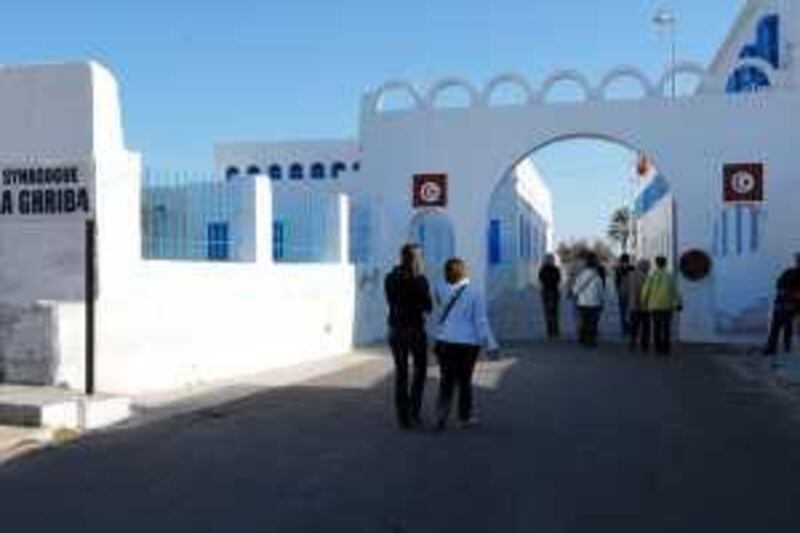ERRIADH, TUNISIA // In 586BC the Babylonian king Nebuchadnezzar laid waste to Jerusalem, inadvertently sowing seeds for a Jewish haven across the sea that has outlived his realm by 25 centuries and counting. Legend tells that refugees fled to the Tunisian island of Djerba, carrying a block from the ruined Temple of Solomon. Today it lies beneath the El Ghriba synagogue, the cornerstone of a thriving Jewish community.
And after decades of Jewish exodus from Arab countries, that community is growing. For western holidaymakers, Djerba is a strip of lavish resorts along a sandy Mediterranean coast. For Tunisians, it also showcases a modern secular society in which Jews and Muslims live together peaceably. Back from the sea is a flat cultivated landscape of palms, olives and prickly pear. Flocks of sheep charge along the roads with young boys running after them.
In the middle of Djerba stands El Ghriba, built in the early 20th century on a site long considered sacred. Near the pulpit, a small door opens on a bolthole where the Jerusalem stone is kept. "It's always been there, so we haven't touched it," said Koudir Hania, the synagogue's caretaker. "Why mess with tradition?" Those traditions are the result of more than two millennia of Jewish presence on Djerba that has withstood successive upheavals.
Trouble in ancient Palestine repeatedly drove Jews into exile. Many made their way to Tunisia, where they quietly flourished through Roman, Vandal and Byzantine rule. Arab armies barrelled into North Africa in the seventh century, bringing Islam and imposing the second-class status of dhimmi on Jews. In the 12th century, the Almohad dynasty went further, ordering Jews to become Muslims or quit the country.
But by now, Tunisia was home. Jews were prominent in commerce and metalworking, trades many families on Djerba still practise today. The community was periodically bolstered by Jews fleeing waves of persecution in Europe. Jews also suffered in Tunisia. They were taxed heavily, shut in ghettos by night and forced to wear distinctive clothing. French colonialism that began in the 19th century abolished the dhimmi status, but it was replaced during the Second World War by the repressive decrees of occupying Nazi forces.
The appeal of Zionism to Tunisia's Jews increased. Many emigrated to Israel after its creation in 1948. Others went to France after Tunisian independence in 1956 saw their businesses nationalised out from under them. Tension over the Six Day War in 1967 spurred more to leave. Today a community that numbered about 100,000 before 1948 has dwindled to some 1,500, a scenario mirrored in other Arab countries.
But now that trend is reversing on Djerba, said Yousef Wazan, head of the Jewish community there. Family businesses, government favour and friendly Muslim neighbours are persuading Jews not to emigrate, raising their numbers to more than 1,000 from about 700 in the past two decades. On the street where Mr Wazan grew up, two new houses are being built for a pair of brothers who are getting married this summer. White villas are going up on vacant land nearby to accommodate growing Jewish families. In the past, Jewish neighbourhoods signalled separation. No longer, Mr Wazan said.
"I'm an Arab," Aziza Hania, 18, Mr Hania's daughter, said. "It's my culture, I speak Arabic, I was born in an Arab country." Ms Hania is planning to study international business in France, but vows to return to Tunisia. "What we have here, you can't find in another country." That is trust, said Neji Omrani, a teacher at the Essouani primary school, where most Jewish children study. A special timetable allows them to attend Jewish religious classes at the same time. Religious differences, and strife, are topics of class discussion. "Encouraging tolerance and respect for the other are part of the official curriculum," Mr Omrani said.
"In class we talk about what happens in the world, but we don't allow it to interfere with our lives." But sometimes it interferes anyway. One April morning in 2002 an explosion rang over the fields. Mr Hania rushed to El Ghriba synagogue to find bodies strewn beside the door and blood flowing between the cobblestones. An enormous car bomb had been detonated by Islamist terrorists outside the synagogue, killing 21 and injuring more than 30.
Al Qa'eda claimed responsibility for the attack, which targeted a yearly pilgrimage. "I felt angry when I saw what had happened," Mr Hania said. "It was an assault on our community and our temple." But the pilgrims keep coming. Today they pass through an airport-style security gate, and police guard the Jewish quarter nearby where Mr Hania lives with his family in a sepia-coloured house. Everyone here knows the legend of the Jerusalem stone.
An older story tells that Djerba is where Odysseus lost some of his men, who found the island so pleasant that they stayed to eat a mythical fruit called lotus. "Everything here is fruit," Mr Hania's wife, Saida, said. "Everything here is good and sweet." jthorne@thenational.ae





